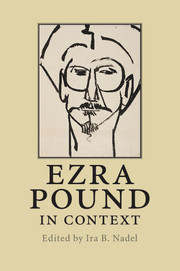Book contents
- Frontmatter
- Contents
- Notes on contributors
- Acknowledgements
- Chronology
- List of abbreviations and note on references to The Cantos
- Introduction
- Part I Biography and works
- Part II Historical and cultural context
- 16 The classics
- 17 Provençal and the troubadours
- 18 Dante and early Italian poetry
- 19 America
- 20 Venice
- 21 London
- 22 Paris
- 23 Rapallo and Rome
- 24 Pisa
- 25 Imagism
- 26 Vorticism
- 27 Music
- 28 Visual arts
- 29 Confucius
- 30 The Orient
- 31 Little magazines
- 32 Publishing and publishers
- 33 Modernism
- 34 Fascism
- 35 Anti-Semitism
- 36 Gender and sexuality
- 37 Race
- 38 Travel
- Part III Critical reception
- Further reading
- Index
38 - Travel
Published online by Cambridge University Press: 05 July 2014
- Frontmatter
- Contents
- Notes on contributors
- Acknowledgements
- Chronology
- List of abbreviations and note on references to The Cantos
- Introduction
- Part I Biography and works
- Part II Historical and cultural context
- 16 The classics
- 17 Provençal and the troubadours
- 18 Dante and early Italian poetry
- 19 America
- 20 Venice
- 21 London
- 22 Paris
- 23 Rapallo and Rome
- 24 Pisa
- 25 Imagism
- 26 Vorticism
- 27 Music
- 28 Visual arts
- 29 Confucius
- 30 The Orient
- 31 Little magazines
- 32 Publishing and publishers
- 33 Modernism
- 34 Fascism
- 35 Anti-Semitism
- 36 Gender and sexuality
- 37 Race
- 38 Travel
- Part III Critical reception
- Further reading
- Index
Summary
“And then went down to the ship” (i/3) begins The Cantos, opening not only in medias res, but also, as it were, on the road, in the midst of a journey which immediately proceeds to chart a series of liminal, shifting spaces. For Canto i moves not only between land and sea, but also between Greek, Latin, and English – as Pound translates Andreas Divus translating Homer – and finally between life and death: most of the Canto is devoted to the “Nekuia,” that is, Odysseus's descent to the underworld in search of Tiresias. Indeed, if The Cantos have no real model, it is worth noting that among the venerable precursors for them which Pound had in mind, perhaps the two most important – The Odyssey and The Divine Comedy – are obviously also both travel poems, organized entirely according to tropes of exile, journey, arrival, and restoration.
As Robert Crawford has pointed out, motifs of homecoming and return were central to the strategies by which many high modernist texts attempted to assert the “structural unity” they might seem to lack, but he quite rightly distances The Cantos from the gestures of circularity by way of arrival and return visible in Ulysses, Finnegans Wake, and The Waste Land. Whatever Pound's plans and intentions may have been, The Cantos distinguish themselves from these works by their consistent deferral of destination, their sacrifice of progression for digression, becoming less a “travel poem” than perhaps a “road poem.” In this light (though certainly not in others), they can seem more analogous to the work of Kerouac, for example, than to that of Pound's modernist friends. Again, to gauge the extremity of The Cantos’ errance and drift, it is worth noting that three of the poems which most clearly work out of the poetics and precedent of Pound's epic – William Carlos Williams’ Paterson, Charles Olson's The Maximus Poems, and Basil Bunting's Briggflatts – all rely heavily on the structural anchoring of a particular site or place, in contradistinction to the wanderings which occur on every level in The Cantos, and perhaps in counterbalance.
- Type
- Chapter
- Information
- Ezra Pound in Context , pp. 424 - 434Publisher: Cambridge University PressPrint publication year: 2010



